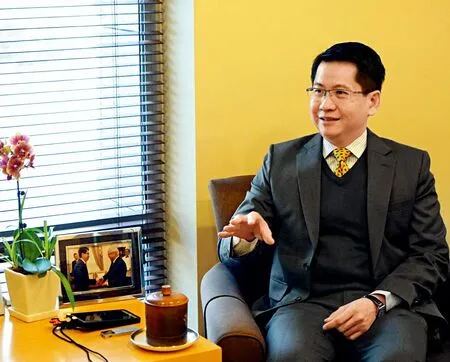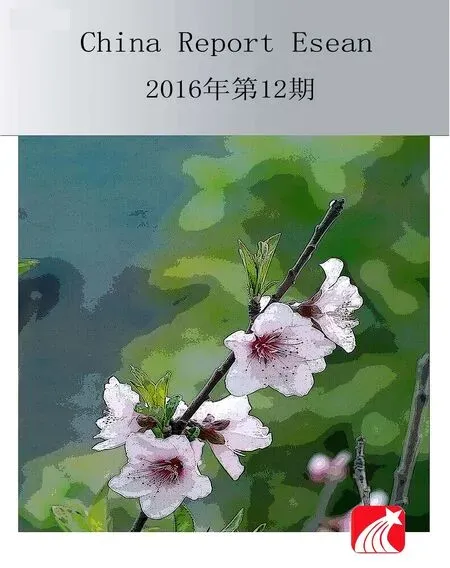Singapore and China: Building on the Past and Opening a Way Toward the Future Exclusive interview with Singaporean Ambassador to China Stanley Loh
By Wang Jiping, Duncan Gordon, Wang Hai
Singapore and China: Building on the Past and Opening a Way Toward the Future Exclusive interview with Singaporean Ambassador to China Stanley Loh
By Wang Jiping, Duncan Gordon, Wang Hai

Stanley Loh, Singaporean Ambassador to China, at an exclusive interview with China Report ASEAN.
Since the establishment of diplomatic ties between China and Singapore 26 years ago, bilateral relations have remained healthy and robust. Singapore’s late founding Prime Minster Lee Kuan Yew was the founder and mover of the Singapore-China relationship. Chinese Premier Li Keqiang said Mr. Lee Kuan Yew’s“contributions towards Singapore-China ties and China’s reform and opening up will surely be recorded in history.” Exchanges and cooperation in the fields of education, culture, environmental protection, tourism and other areas have also been strengthened. Recently,China Report ASEANsat down for an exclusive interview with Mr. Stanley Loh, the Singaporean Ambassador to China, to look back on the development of the bilateral relationship between these two countries and look toward the future.
China Report ASEAN:How would you evaluate the development of the relationship between China and Singapore after the establishment of diplomatic relations in 1990?
Mr. Stanley Loh:I would use two words to describe the relationship:“dynamic” and “unique”.
The Singapore-China relationship is “dynamic” because cooperation between our two countries has evolved according to our development and changing needs. For example, when the two countries first established diplomatic relations, then Prime Minister Lee Kuan Yew suggested cooperating with China to share Singapore’s experience in attracting foreign investment. That was what led us to build the Suzhou Industrial Park, our first government-to-government project with China. In 2007, when China became more focused on sustainable and eco-friendly development, we embarked on our second government-to-government project —the Sino-Singapore Tianjin Eco-city. One of the key features of the Tianjin Eco-city is the low-carbon buildings that use clean and renewable energy like wind and solar power. Last year, when Chinese President Xi Jinping made his state visit to Singapore, we launched our third government-to-government project, the China-Singapore (Chongqing) Demonstration Initiative on StrategicConnectivity, which would complement China’s development strategies such as the “Belt and Road Initiative”, Yangtze River Economic Belt and the Development of Western China.
The Singapore-China relationship is “unique” because of the high-level platforms we have established to exchange experiences on Leadership Development and Social Governance. This is not common among China’s relations with other countries, and is indicative of the mutual trust that exists between our two countries. We also have longstanding cooperation in human resource development. Since the mid-1990s, about 55,000 Chinese officials have attended various training programs in Singapore. Increasing numbers of Singapore officials are also visiting China for study to improve their understanding of China.
China Report ASEAN:In 2016, the world has changed a lot and some experts we have interviewed find the China-Singapore relationship to be a friendly one, but not without problems. What are your opinions on such an idea and what kinds of e ff orts should be taken for promoting the bilateral relationship?
Mr. Stanley Loh:I think the overall bilateral relationship between Singapore and China is good. We have no bilateral disputes. Since we are close friends and neighbors, I think it is natural that we sometimes hold different opinions on regional issues. I also believe that no two truly independent countries can agree on every single issue. What is more important is that we continue to have frequent and frank conversations to understand each other’s concerns. We should seek to expand our common ground and shelve our di ff erences, to positively develop the bilateral relationship and achieve common goals.
Secondly, as for future cooperation, we should continue to work on existing projects. We are also working on the upgrade of the China-Singapore Free Trade Agreement (CSFTA). Singapore was the first country to launch negotiations on a bilateral FTA with China. At that time, China did not have much experience with FTAs, so Singapore served as a test pilot. Since the coming into force of the CSFTA in 2009, our bilateral trade and investments have grown tremendously. Singapore was the largest source of foreign direct investment to China in 2013, 2014 and 2015, as well as in the first half of this year. Meanwhile, China is Singapore’s largest trading partner. China has since accumulated more experience in FTAs. Given the rise of protectionism and anti-globalization around the world, a comprehensive and substantive upgrade of the CSFTA would demonstrate our joint commitment to liberalization and freer trade.
China Report ASEAN:What’s your opinion on the Belt and Road Initiative?
Mr. Stanley Loh:It is a very good initiative that fills a need for greater connectivity. Singapore strongly welcomes it. I think it is a very important area in which China and Singapore can work together. The initiative can also complement the ASEAN Masterplan for Connectivity.
I suggest that China, Singapore and other ASEAN countries should work together to transform this Initiative from being a Chinese proposal into a regional initiative. We should build a common “Silk Road spirit” to strengthen the sense of ownership and participation in this Initiative. Moreover, since the Belt and Road refers to the new Silk Road Economic Belt and the 21st Century Maritime Silk Road, it should also focus on the modern and forward-looking elements of connectivity, including aviation, logistics, finance and ICT, and not just traditional connectivity.
China Report ASEAN:It is well known that embassy plays an important role in promoting the bilateral relationship. What are your plans for 2017?
Mr. Stanley Loh:Last year, to commemorate the 25th anniversary of Singapore-China diplomatic relations, the Embassy worked with Singaporean companies in China to launch a charity project to give back to society.
After discussing with the Chinese State Council’s Poverty Alleviation Of fice, we decided to build three dormitories for primary school students in Ludian, which had experienced a major earthquake in August 2014. As I understood, there were many local children in Ludian who had to walk long hours to go to school because of the mountainous terrain in Yunnan. The dormitories would allow more children to go to school. In 2017, I plan to visit Ludian to attend the naming ceremony of the three “Singapore-China Friendship” dormitories.
China Report ASEAN:Singapore is a popular travel destination among Chinese. What places in Singapore do you recommend to Chinese travelers?
Mr. Stanley Loh:Singapore and China share a long history of people-to-people ties. This year marks the 150th anniversary of the birth of Dr. Sun Yat-sen, and both Singapore and China have held various commemorative events. In Singapore, about 75 percent of our population is ethnic Chinese. But I want to highlight that we are a multi-racial and multi-cultural society with significant proportions of our population being Malays, Indians and Eurasians.
So if you do not have enough time to visit many dif f erent countries in Southeast Asia, why not come to Singapore? It is a melting pot of Chinese, Indian, Malay and even Peranakan (descendants of mix marriages between Chinese immigrants and Malays) cultures.
I suggest that China, Singapore and other ASEAN countries should work together to transform this Initiative from being a Chinese proposal into a regional initiative.
- China Report Asean的其它文章
- Should We Stay or Should We Go? What multinationals should look for as they decide to keep production in China or move it to ASEAN countries
- Tourism Set to Drive Indonesia’s Economy Forward
- Brunei Envoy Pays Tribute To the King of Boni
- Lost in Vietnam: A Co-Production Love Comedy
- Cycling in Hainan A New Avenue For Tourism
- Bambang Susantono: Infrastructure Development Requires Efforts From All Sides

